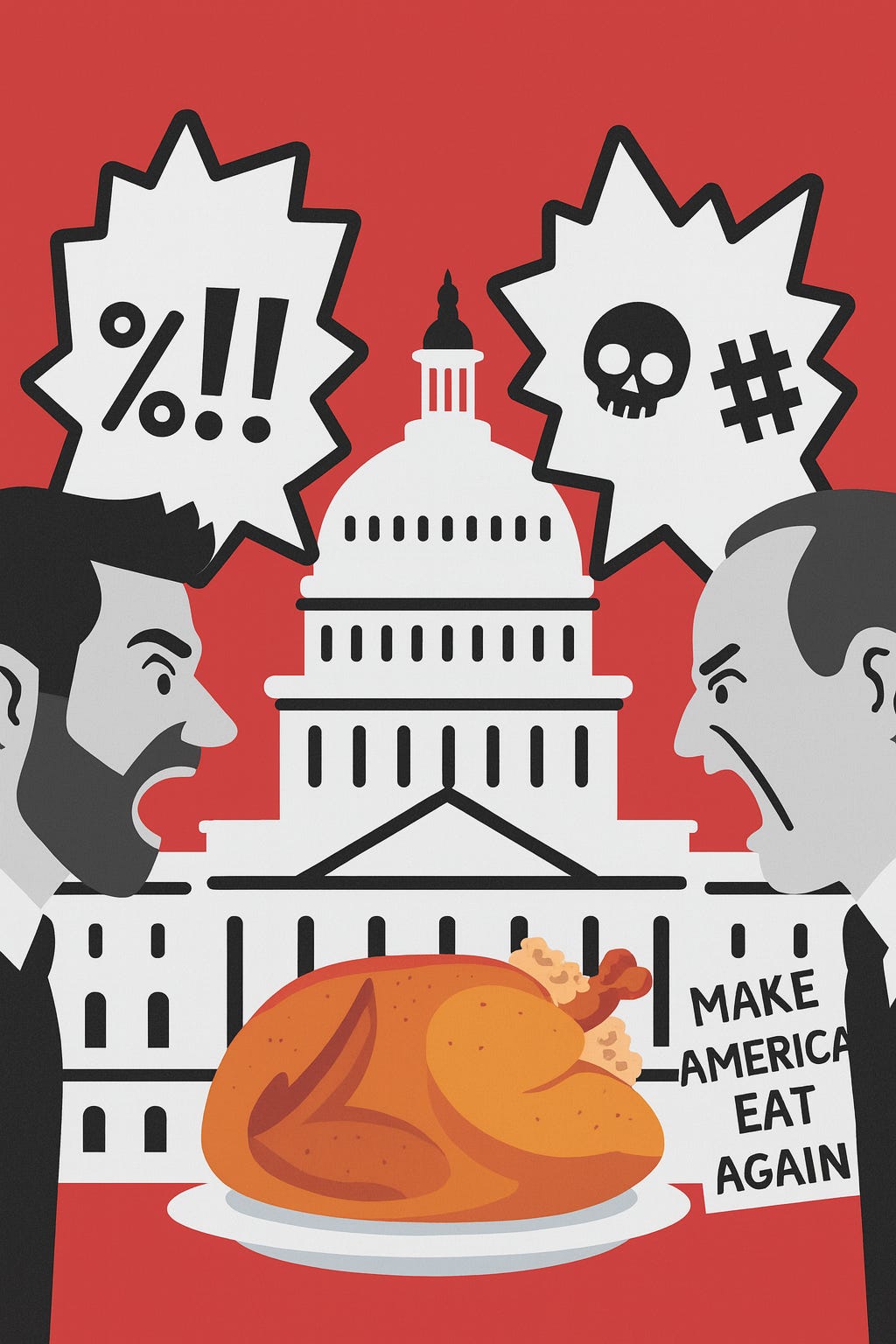Thanksgiving and the art of disagreement
How to have a thoughtful holiday dinner conversation in the age of algorithms, binary thinking, and cancel culture.

The New York Times’ Opinion section is one of the first places the Collapse Life team goes to stoke our outrage. There’s always something there to help push our blood pressure into the ‘unhealthy’ level.
Back in July, Obama-era (blood pressure rising) speechwriter David Litt penned an essay (rising higher) with a title that grabbed our attention: “Is It Time to Stop Snubbing Your Right-Wing Family?” (ding-ding-ding — unhealthy levels now!)
Yes, it’s time. Move on. What are you, a child? (By the way, any journalist and/or editor worth their salt knows not to ask a yes-no question in a headline.)
At any rate, the piece is about how Litt spent the pandemic giving his brother-in-law the cold shoulder and here’s the bit that’ll boil your blood:
I wasn’t shocked when Matt didn’t get a Covid shot. But I was baffled. Turning down a vaccine during a pandemic seemed like a rejection of science and self-preservation. It felt as though he was tearing up the social contract that, until that point, I’d imagined we shared.
Had Matt been a friend rather than a family member, I probably would have cut off contact. As it was, on the rare and always outdoor occasions when we saw each other, I spoke in disapproving snippets.
“Work’s been good?”
“Mhmm.”
My frostiness wasn’t personal. It was strategic. Being unfriendly to people who turned down the vaccine felt like the right thing to do. How else could we motivate them to mend their ways?
‘Strategic frostiness?’ It might be time to grow up.
The sad part is that this was the official advice from ‘respectable’ media outlets for years: cut them off. Don’t talk to your vaccine-hesitant cousin, your uncle who listens to Joe Rogan, your neighbor who questions official narratives.
Now? The narrative has shifted: the message changing and the mainstream is saying maybe talk to them again?
Sifting through the puerility, Litt’s point is that ostracism didn’t make anyone wiser. It just made everyone lonelier. His eventual reconciliation with his brother-in-law didn’t come via “debate.” It came from getting out in the ocean and going surfing together.
We use Litt’s outrage-inducing essay here to make a point: humans don’t change their minds through being shamed. Rather, it’s by connecting on our common ground, our shared humanity, and by being provoked into small acts of curiosity that make us question what we once believed by virtue of membership in an ideological tribe.
In 2021, social pressure replaced dialogue. To question anything was to defect from the 'in’ crowd. Friends blocked each other; families fractured; whole communities split along epidemiological, ideological, and digital lines. The result was complete social fragmentation. An October 2024 survey by the American Psychiatric Association found that 1 in 5 people have cut ties with a family member because of political arguments.
Here at Collapse Life we want to see our readers engage in actual conversations with their friends and family — even if that turns messy and uncomfortable — rather than opting to cut ties with someone who holds different views.
You know as well as we do that you can’t “fact-check” your way to sanity, or “cancel” your way to truth. So what if this Thanksgiving, instead of avoiding hard conversations, we learned how to have better conversations?
The goal isn’t winning an argument or converting someone to your belief system. It’s planting seeds of critical thinking without having anyone flip the table over in anger.
That’s why we created The Collapse Life Guide to Uncomfortable Thanksgiving Conversations — a ten-step survival manual for anyone brave enough to wade into the ideological swamp of modern family dinners.
We created this for our premium subscribers last year as a practical, irreverent, and honest tool for:
how to read the room before you wade into politically-charged conversations,
how to lead with questions instead of lectures,
and how to recognize when it’s time to pass the gravy and retreat.
If you’re tired of algorithm-approved small talk or holding your tongue instead of speaking your mind, grab your copy for just $4.99 on Buy Me a Coffee and make this Thanksgiving count for something more than leftovers.
Given all the insanity we’re facing in 2026, talking again might just be the most radical act of thanks in 2025.



It is the fundamental difference between a cult and a religion.
The basic strategy that cults use to keep their people in line is to actively discourage any possible conversation with people who may have a differing opinion.
When what you believe has no merit, it can't withstand logical scrutiny.